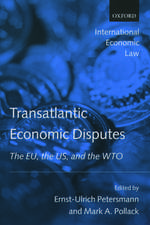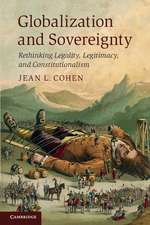Delegation and Agency in International Organizations: Political Economy of Institutions and Decisions
Editat de Darren G. Hawkins, David A. Lake, Daniel L. Nielson, Michael J. Tierneyen Limba Engleză Paperback – 13 sep 2006
| Toate formatele și edițiile | Preț | Express |
|---|---|---|
| Paperback (1) | 327.88 lei 6-8 săpt. | |
| Cambridge University Press – 13 sep 2006 | 327.88 lei 6-8 săpt. | |
| Hardback (1) | 852.72 lei 6-8 săpt. | |
| Cambridge University Press – 13 sep 2006 | 852.72 lei 6-8 săpt. |
Din seria Political Economy of Institutions and Decisions
-
 Preț: 235.99 lei
Preț: 235.99 lei -
 Preț: 231.82 lei
Preț: 231.82 lei -
 Preț: 177.53 lei
Preț: 177.53 lei -
 Preț: 211.85 lei
Preț: 211.85 lei -
 Preț: 200.87 lei
Preț: 200.87 lei -
 Preț: 306.68 lei
Preț: 306.68 lei -
 Preț: 208.16 lei
Preț: 208.16 lei -
 Preț: 133.60 lei
Preț: 133.60 lei -
 Preț: 295.55 lei
Preț: 295.55 lei -
 Preț: 236.43 lei
Preț: 236.43 lei -
 Preț: 228.38 lei
Preț: 228.38 lei -
 Preț: 265.11 lei
Preț: 265.11 lei -
 Preț: 281.49 lei
Preț: 281.49 lei -
 Preț: 285.37 lei
Preț: 285.37 lei -
 Preț: 279.98 lei
Preț: 279.98 lei - 14%
 Preț: 773.75 lei
Preț: 773.75 lei -
 Preț: 233.38 lei
Preț: 233.38 lei -
 Preț: 247.41 lei
Preț: 247.41 lei -
 Preț: 203.12 lei
Preț: 203.12 lei -
 Preț: 230.33 lei
Preț: 230.33 lei -
 Preț: 286.69 lei
Preț: 286.69 lei - 14%
 Preț: 790.57 lei
Preț: 790.57 lei -
 Preț: 265.32 lei
Preț: 265.32 lei - 11%
 Preț: 554.15 lei
Preț: 554.15 lei -
 Preț: 287.07 lei
Preț: 287.07 lei - 11%
 Preț: 700.20 lei
Preț: 700.20 lei -
 Preț: 273.13 lei
Preț: 273.13 lei -
 Preț: 459.84 lei
Preț: 459.84 lei -
 Preț: 280.35 lei
Preț: 280.35 lei -
 Preț: 260.11 lei
Preț: 260.11 lei - 11%
 Preț: 640.30 lei
Preț: 640.30 lei -
 Preț: 286.89 lei
Preț: 286.89 lei -
 Preț: 247.80 lei
Preț: 247.80 lei - 11%
 Preț: 691.81 lei
Preț: 691.81 lei -
 Preț: 287.48 lei
Preț: 287.48 lei - 11%
 Preț: 641.80 lei
Preț: 641.80 lei - 11%
 Preț: 635.32 lei
Preț: 635.32 lei -
 Preț: 271.01 lei
Preț: 271.01 lei -
 Preț: 265.70 lei
Preț: 265.70 lei -
 Preț: 227.83 lei
Preț: 227.83 lei
Preț: 327.88 lei
Nou
Puncte Express: 492
Preț estimativ în valută:
62.75€ • 65.27$ • 51.80£
62.75€ • 65.27$ • 51.80£
Carte tipărită la comandă
Livrare economică 15-29 aprilie
Preluare comenzi: 021 569.72.76
Specificații
ISBN-13: 9780521680462
ISBN-10: 0521680468
Pagini: 426
Ilustrații: 23 tables
Dimensiuni: 157 x 227 x 25 mm
Greutate: 0.66 kg
Editura: Cambridge University Press
Colecția Cambridge University Press
Seria Political Economy of Institutions and Decisions
Locul publicării:Cambridge, United Kingdom
ISBN-10: 0521680468
Pagini: 426
Ilustrații: 23 tables
Dimensiuni: 157 x 227 x 25 mm
Greutate: 0.66 kg
Editura: Cambridge University Press
Colecția Cambridge University Press
Seria Political Economy of Institutions and Decisions
Locul publicării:Cambridge, United Kingdom
Cuprins
Part I. Introduction: 1. Delegation under anarchy: states, international organizations, and principal-agent theory Darren G. Hawkins, David A. Lake, Daniel L. Nielson and Michael J. Tierney; Part II. Variation in Principal Preferences, Structure, Decision Rules, and Private Benefits: 2. A problem of principals: common agency and social lending at the multilateral development banks Mona Lyne, Daniel L. Nielson and Michael J. Tierney; 3. US domestic politics and international monetary fund policy J. Lawrence Broz and Michael Brewster Hawes; 4. Why multilateralism? Foreign aid and domestic principal-agent problems Helen V. Milner; 5. Distribution, information, and delegation to international organizations: the case of IMF conditionality Lisa L. Martin; 6. Delegation and discretion in the European Union Mark A. Pollack; Part III. Variation in Agent Preferences, Legitimacy, Tasks, and Permeability: 7. How agents matter Darren G. Hawkins and Wade Jacoby; 8. Screening power: international organizations as informative agents Alexander Thompson; 9. Dutiful agents, rogue actors, or both? Staffing, voting rules, and slack in the WHO and WTO Andrew P. Cortell and Susan Peterson; 10. Delegating IMF conditionality: understanding variations in control and conformity Erica R. Gould; 11. Delegation to international courts and the limits of recontracting political power Karen J. Alter; Part IV. Directions for Future Research: 12. The logic of delegation to international organizations David A. Lake and Mathew McCubbins.
Recenzii
' … provides a stimulating contribution to the analysis of international organization …' Review of Industrial Organization
'Delegation and Agency in International Organization develops a sophisticated Principal-Agent approach to elucidate the sources, limits and consequences of IO autonomy. The volume is unified by thoughtful application of the theory to a range of important cases and also includes more critical perspectives questioning whether PA theory provides an adequate analysis. There is no better statement of how PA models help us understand the importance and operation of international institutions and organizations. It is essential reading for scholars and students who want to really understand international organizations.' Duncan Snidal, The University of Chicago
'Delegation and Agency in International Organization develops a sophisticated Principal-Agent approach to elucidate the sources, limits and consequences of IO autonomy. The volume is unified by thoughtful application of the theory to a range of important cases and also includes more critical perspectives questioning whether PA theory provides an adequate analysis. There is no better statement of how PA models help us understand the importance and operation of international institutions and organizations. It is essential reading for scholars and students who want to really understand international organizations.' Duncan Snidal, The University of Chicago
Descriere
An examination of the delegation of authority from state governments to international organizations.
















